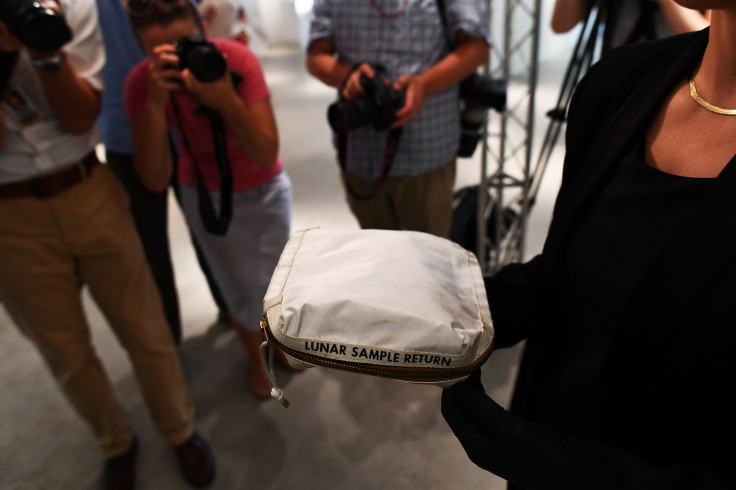Sotheby's Moon Rocks Auction Prompts Calls For UN To Prevent Commercialization Of Space

A $1.8 million Sotheby’s auction Thursday of a bag filled with Neil Armstrong's lunar rocks has sparked calls for the United Nations to set up property rules for the moon.
A nonprofit group called For All Moonkind agrees with NASA that priceless artifacts like the moon bag are a precursor to the future exploitation of space goods that will happen if the U.N. doesn’t step in to declare six lunar landing sites as landmarks of international importance. The space agency and For All Moonkind’s co-founder, Michelle Hanlon, agree that the moonbag and other space artifacts are of mutual significance to human beings and are “never meant to be owned by an individual.”
“The bag belongs in a museum, so the entire world can share in and celebrate the universal human achievement it represents,” Hanlon said in a statement Tuesday. “We formed For All Moonkind with a mission to ensure the Apollo landing sites be recognized by the United Nations for their outstanding value to humanity and protected for posterity.”
Read: Sotheby's Space Exploration Auction: Apollo 11 Lunar Sample Bag, Hundreds Of Items Up For Sale
As China, Russia and the U.S. continue space pursuits, For All Moonkind hopes to curb the commercialization of space products from opportunistic, capitalist ventures.
“Imagine what Armstrong’s urine bag would go for,” said Hanlon, who is studying at McGill University’s Institute of Air & Space Law to begin practicing space law. “These are the kinds of questions that no one is thinking about. We don’t want robots coming back with artifacts and selling them.”
The controversial moon bag at the center of the controversy was used by Neil Armstrong to collect rocks on the moon’s surface during the 1969 Apollo 11 mission. The U.S. Government accidentally sold the moon bag to a suburban Chicago attorney, Nancy Lee Carlson, in 2015. In February, a federal court ruled that Carlson’s purchase of the mislabeled bag in an online U.S. Marshals Service auction was within the law. NASA was ordered to return the bag to her – which cost $995 – after the yearlong legal battle.
Apollo 11 Moon Dust-Stained Lunar Sample Bag May Set Sale Record at Sotheby's https://t.co/BCwSZrxzpL pic.twitter.com/zYHJDsxtbI
— SPACE.com (@SPACEdotcom) July 18, 2017
“The decision by Nancy Lee Carlson and Sotheby's to auction off an Apollo 11 Lunar Sample Return Decontamination Bag is a sobering wake-up call,” said Hanlon, who is set to lay out her arguments for U.N. input at Starship Congress 2017 in Monterey, Calif., from Aug. 7-9.
The bag was expected to fetch around $4 million today at the Sotheby’s auction in New York, but the gavel came down at $1,812,500 USD including all fees. Cassandra Hatton, vice president and senior specialist at Sotheby’s, said “exceptionally rare” pieces like the moon rocks could become collector’s item cash cows.
“This bag is not only from the first mission, but it was used by the first man to set foot on the moon, and it held the first samples that were collected,” Hatton told The New York Times. “So it’s the first of the first of the first.”
For All Moonkind is moving to create a “Unesco for space,” as Hanlon, a Connecticut attorney explained to Bloomberg. She is leading the group to fight for U.N. world heritage designations in space. As it stands currently, the legal standard for space activity stems from the 1967 Outer Space Treaty. Administered by the U.N.’s Vienna-based Office for Outer Space Affairs, it clears outer space of any and all national sovereignty or ownership claims. It also restricts the moon and other celestial bodies from any non-peaceful activities.
For All Moonkind’s organizers want to prevent the commercialization of outer space cultural heritage – be it on the moon or Mars – in ways similar to Earthly laws preventing the trafficking of artifacts.
© Copyright IBTimes 2025. All rights reserved.



















